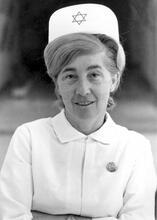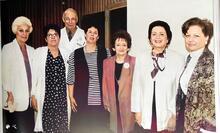Bertha Landsman
At the beginning of the 1920s, Bertha Landsman, the only registered nurse in Palestine, established community nursing in Israel. She possessed knowledge, initiative and managerial skills, which she used as a public health nurse and in social work. Her career spans from working for the New York City public health department, to founding Hadassah’s public health nursing services in Jerusalem, to administrative work. She helped develop a unique body of knowledge in community nursing and is remembered for her outstanding work ethic and meticulous standards, as well as her passion for the nursing field. Landsman dedicated her life to nursing, becoming one of many who laid the foundation of the nursing profession in Palestine.
At the beginning of the 1920s, Bertha Landsman, who was the only registered nurse in Palestine, established community nursing in Israel. She possessed knowledge, initiative and managerial skills, which she used as a public health nurse and in social work. She worked with Jewish, Christian, and Muslim women, persuading them to abandon folk superstition in favor of “correct knowledge and information,” and also taught nursing to local women students, which was no less a challenge.
Landsman described these pupils critically:
It was an uphill and victorious fight, training a group of young girls, gathered in Palestine from the four corners of the earth, to measure up to the high American standards of public health nurses. Many of these nurses are highly intelligent but have no flair for system and no patience for details, and they are resentful of discipline. (Landsman, “Nursing in Palestine”)
Early Life and Education
Bertha Landsman was born in Zhitomir (Zhytomyr, Ukraine) on June 12, 1882. Her father, Moshe Landsman, a tailor, was born in a town near Zhitomir in 1859 and married Jessie (Chasi) Wagman (Zhitomir 1863) in 1880. Jessie was a homemaker and a skilled quiltmaker. The family emigrated to the United States (New York) before 1896. Bertha had four siblings: Sara, Wolf, Lena and Tootsie. Her father died in 1941 and her mother in 1949.
Landsman graduated as a registered nurse in 1913 from the nursing school at Lebanon Hospital in New York City. Henrietta Szold, who wished to send two experienced public-health nurses to Jerusalem, interviewed her during her last year of studies. Although Landsman, who had little experience in the field at the time, was not chosen, her meeting with Szold impressed her so deeply that she decided to prepare herself for a journey to Palestine later on.
Nursing and Teaching Career
From 1913 to 1920 Bertha worked for New York City’s public health department in child welfare and hygiene clinics at schools, for the social services at Mount Sinai Hospital in New York, and for about a year at the Battle Hill Tuberculosis Sanitorium in Atlanta, Georgia. She arrived in Palestine in 1920, worked for two years in the pediatrics department at Hadassah Hospital in Jerusalem, and then founded Hadassah’s public health nursing services department, where she worked until 1936. These first baby welfare clinics, the Tipat Halav (lit. “Drop of Milk”), were run according to high American standards and served as a model for the entire country.
In 1922, when two well-baby clinics were established in Jerusalem, one in the Old City and the other in the Sha’arei Pinnah neighborhood, Landsman began giving practical and theoretical training to four students, thus launching the course in public health for registered nurses. This activity was operated in collaboration with the Histadrut Nashim Ivriot (Hebrew Women’s Organization) and the Mothers’ Assistance Association. The Tipat Halav stations, which prepared and distributed pasteurized milk, operated in the Old City from 1922 to 1927. Trachoma and tuberculosis clinics were founded in 1926–1927. Within two years of the opening of the first clinic, nurses trained by Landsman were working in four clinics in Rehovot, Jerusalem, Petah Tikvah and Tiberias. Part of the evolution of the Health Welfare Department, this activity was a significant factor in the decrease in the morbidity and mortality rates of babies in the Jewish Jewish community in Palestine prior to the establishment of the State of Israel. "Old Yishuv" refers to the Jewish community prior to 1882; "New Yishuv" to that following 1882.Yishuv.
Public Health Nursing
Between 1922 and 1933, Landsman’s training centers trained ninety to a hundred registered nurses for the public health system. A large number of practical nurses who worked for the General Health Fund and Popular Health Fund were sent to the center for short courses.
Public willingness to use hospitals not only to treat the incurable poor but also for childbirth testified to the modernization of the health services. In light of this change, Landsman organized the training and employment of midwives at Rothschild Hospital in Jerusalem. She was influenced by New York’s Henry Street Settlement, founded by Lillian Wald. Landsman’s goal, like Wald’s, was to train “general” nurses in public health, who would be competent to engage in all areas: prenatal, obstetrics, midwifery, baby care, the battle against tuberculosis, schools and home visits. In the belief that the principles of public-health nursing were based on methodology and structure, Landsman helped develop a unique body of knowledge in community nursing, together with the nursing paradigm for patient follow-ups, study and research.
Beginning in 1928, Landsman also served as matron of the Hadassah Medical Organization while Hadassah Schedrovitzky-Sapir managed the school under her sponsorship, together with some of the hospital’s nursing services. When Shulamit Cantor arrived in 1934 and assumed the leadership, Landsman was relegated to her former post as supervisor of community nursing. Unwilling to manage this field under Cantor, Landsman left the country in 1936.
She remained in New York for three years, continuing training in her special field and keeping her nursing knowledge up to date. She also took a management course at New York University.
Administrative Work
Before the hospital moved to Mount Scopus in 1939, the management of Hadassah realized they needed to separate the post of Director of Hospital Nursing Services from that of the director of the nursing school. In consequence, Landsman was asked to serve in the former position, which she did until 1951.
As an administrator, Landsman was remarkable for her organizational skills, her outstanding ability to evaluate workers, her meticulous requirements of the nursing staff, her striving for order and aesthetics, and her excellent rapport with Dr. Haim Yassky (1896–1948), director of Hadassah Hospital in Jerusalem from 1928 to 1948.
Bertha Landsman died in 1962. Never married, she dedicated her life to nursing, becoming one of the generation of giants who laid the foundation of the nursing profession in Palestine, part of the American influence on the Yishuv’s development.
Selected Works
“Women’s Zionist Organization: Training Nurses for Public Health Work in Palestine.” Public Health Nurses (1924): 528–530.
“Development of Public Health in Palestine.” Public Health Nurses 20 (1928): 77–79.
“Nursing in Palestine.” R. N.: A Journal for Nurses 1, 5–6 (1938): 22–26.
Bartal, Nira. “Theoretical and Practical Training of Jewish Nurses in Mandatory Palestine, 1918–1948, through the Prism of the Hadassah School of Nursing, Jerusalem.” Ph. D. diss., Hebrew University (Hebrew). Jerusalem, 2000.
Glass, Joseph. “Immigration of American Jewish Women to Erez Israel, 1918–1939.” In Jewish Women in the Yishuv and Zionism: A Gender Perspective. Edited by Margalit Shilo, Ruth Kark, Galit Hasan-Rokem (Hebrew). Jerusalem: 2001.
Heiman-Elkind, Henia. Interview with author. Jerusalem: 2003.
Levin, Marlin. Balm in Gilead: The Story of Hadassah. New York: 1974.
“Miss Bertha Landsman, Director of Nurses, Rothschild Hebrew University Hospital.” Memo dictated by Landsman, September 9, 1949. The Archives of the Hadassah Medical Organization in New York (record group 2).
Shehory-Rubin, Zipora. “Hadassah’s Educational Enterprises and Health Activities during Mandatory Times.” Ph. D. diss., Ben-Gurion University of the Negev (Hebrew). Beersheva, 1998, 50–53.
Archives of the Hadassah Nursing School (J117) and of the Hadassah Medical Organization (J113), the Central Zionist Archives in Jerusalem, and the Archives of the Hadassah Medical Organization in New York (record group 2).






